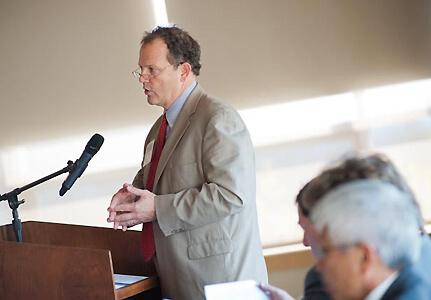The layout of the Grand Maple Ballroom in the Davis Center revealed a lot about what organizers hoped to achieve at the second annual Food Systems Symposium, held Nov. 7.
On the one hand, it was what you’d expect, given the event: about 20 round tables stationed in front of a stage with a podium.
But behind them and in a neighboring room was something different: three rectangular sets of adjoined tables with chairs facing in, each sprouting a large white sign with an imposing title: Human Health and Well Being, Environmental Impacts, and Food Production and Distribution.
The mixed décor was no accident.
For the first hour, the 70 participants – about two-thirds UVM faculty and graduate students from 14 disciplines and the remainder off-campus members of the broader food systems community – heard from a panel of state government leaders on the food systems-related research needs of the agencies they oversee. Interim president John Bramely also delivered a brief address on the critical role Vermont and UVM can play in finding sustainable alternatives to the current food system.
Afterwards, they headed for one of the themed tables, rolled up their sleeves, and spent the bulk of the four-hour event responding -- or preparing to respond -- to a request-for-proposal that caught their interest, selected from a slew of RFP’s from the EPA, USDA, and NIH the event’s organizers had identified, grouped by general topic area, and sent to participants in advance.
“We want this to be a working session,” said School of Business Administration faculty member Rocki-Lee Dewitt, one of the event’s organizers, in remarks setting up the day. “We thought the best way to do that would be to get ideas from the state and combine those with your expertise and our identification of research opportunities” via the RFPs.
State of the state
Research ideas from the state they heard aplenty – delivered by Chuck Ross, secretary of the Agency of Agriculture, Food and Markets; Harry Chen, commissioner of the Department of Health; Patricia Moulton Powden, deputy secretary of the Agency of Commerce and Community Development; and Chris Recchia, deputy secretary of the Agency of Natural Resources.
They ranged from a point made by Ross, the first speaker, that UVM research needs to help the state above all maintain its working landscape, while addressing other vital issues like health and environment, to one made by Recchia, who spoke last, that research was needed to develop sound policy protecting farms from extreme weather events like Tropical Storm Irene, which climate change will make more common.
Traction gained
That idea gained traction at the Food Production and Distribution table, when the brainstorming part of the day began, via an RFP the group decided to tackle titled “Sustainable food systems to improve food security,” a five-year, $5 million grant from USDA’s Agriculture and Food Research (AFRI) division.
After hearing the diverse backgrounds of those seated around the table, facilitator Linda Berlin, director of UVM’s Center for Sustainable Agriculture, seemed energized.
“It’s exciting to hear all these possibilities,” she said. “There’s definitely a wide array, but I see a picture emerging from all the things you laid out.”
Tropical Storm Irene was much on everyone’s mind and brought focus to the discussion.
“Here are the kinds of questions we could ask,” Berlin said. “What are the storage opportunities that could help insulate us to climate change? What’s the food access in those situations? Where are we producing food? Where are the vulnerable spots? How do we get food to people who suddenly don’t have access?"
What made sense to the group was to use Irene as a model for how Vermont, and other regions, could develop resilient food systems that would protect against increasingly common disruptive events like Irene.
The group committed to sending a letter of intent to AFRI within two weeks and producing the full blown proposal by next summer.
Palpable progress
Not every group got as far, but the concreteness of the exercise – and opportunity it provided for an array of researchers, normally siloed in their disciplines, to exchange ideas – created excitement and determination in the room that was palpable.
Plant and Soil Sciences assistant professor Ernesto Mendez, who facilitated the Environmental Impacts group, saw great benefit in the discussion he led.
"As a Food Systems spire, it is very important to organize events where people can share ideas and get to know each other better," he said. "Using working groups to seek funding is a good way to do this, but in the end the most important contribution is convening people and providing a space for exchange."
The diversity of the gathering was one of its strengths, with transportation engineers, microbiologists, consumer behavior experts, for example, all collaborating on a problem – and getting to know one another’s expertise in the process.
“I don’t know what you know,” Berlin could be overheard telling Julie Smith, a faculty member in UVM Extension who specializes in biosecurity and health management on farms.
“The room was buzzing, conversations were happening, and collaborators were linking up,” said Jane Kolodinsky, co-chair of the steering committee for the Food Systems spire within the Transdisciplinary Research Initiative. “That was the ultimate goal.”
“It was fabulous way to do things,” said Ben Amsden of the Center for Rural Partnerships at Plymouth State University in Plymouth, N.H., who participated in the group responding to the AFRI RFP. “This meeting was special. The concreteness of the ideas, the concrete proposal – it was worth the trip.”
The symposium was conceptualized by the Food Systems Steering Committee, with Kolodinsky, co-chair Naomi Fukagawa, professor of medicine, and Dewitt taking the lead in organizing it. Class of '10 graduate Haylee Johnson, events and coordination assistant for the Food Systems Steering Committee, was also instrumental.
Organizers will follow with each of the teams to determine what next steps are and to facilitate progress toward the development of grant proposals.
